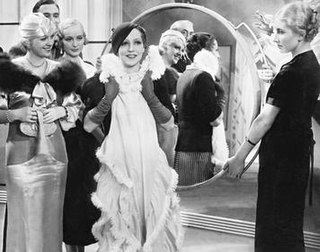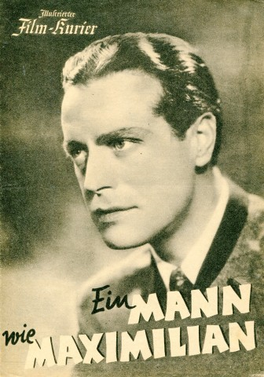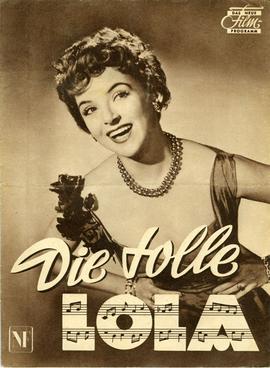
Between Yesterday and Tomorrow is a 1947 German drama film directed by Harald Braun and starring Hildegard Knef, Winnie Markus and Sybille Schmitz.

Maria Ilona is a 1939 German historical drama film directed by Géza von Bolváry and starring Paula Wessely, Willy Birgel, and Paul Hörbiger. The film is set in Austria during the reign of Ferdinand I. It is an adaptation of Oswald Richter-Tersik's novel Ilona Beck.

Just Once a Great Lady is a 1934 German comedy film directed by Gerhard Lamprecht and starring Käthe von Nagy, Wolf Albach-Retty and Gretl Theimer. Nagy plays a car saleswoman. The film's sets were designed by the art directors Otto Erdmann and Hans Sohnle. A separate French-language version A Day Will Come (1934) was also released, with Nagy reprising her role alongside Jean-Pierre Aumont.

Two Hearts Beat as One is a 1932 German musical film directed by Wilhelm Thiele and starring Lilian Harvey, Wolf Albach-Retty and Kurt Lilien. It was shot at the Babelsberg Studios in Berlin. The film's sets were designed by the art directors Werner Schlichting and Benno von Arent. A separate French-language version The Girl and the Boy was made, also starring Harvey.

The Congress Dances is a 1955 Austrian historical musical film directed by Franz Antel and starring Johanna Matz, Rudolf Prack and Hannelore Bollmann. It is a remake of the 1930 film The Congress Dances.

Spring Parade is a 1934 comedy film directed by Géza von Bolváry and starring Paul Hörbiger, Franciska Gaal, and Wolf Albach-Retty.

Dangerous Guests is a 1949 West German comedy film directed by Géza von Cziffra and starring Wolf Albach-Retty, Vera Molnar and Paul Kemp.It was made at the Wandsbek Studios of the Hamburg-based Real Film. The film's sets were designed by the art director Mathias Matthies. It was remade by von Cziffra in 1960 as the Austrian film Crime Tango.

A Mother's Love or Mother Love is a 1939 drama film directed by Gustav Ucicky and starring Käthe Dorsch, Paul Hörbiger and Wolf Albach-Retty.

When the White Lilacs Bloom Again is a 1953 West German drama film directed by Hans Deppe and starring Willy Fritsch, Magda Schneider and Romy Schneider. It was shot at the Tempelhof Studios in West Berlin and on location around Wiesbaden in Hesse. The film's sets were designed by the art directors Alfred Bütow and Ernst Schomer.

A Man Like Maximilian is a 1945 German comedy film directed by Hans Deppe and starring Wolf Albach-Retty, Karin Hardt and Lizzi Waldmüller. It was one of the last films released during the Third Reich and was playing in cinemas during the Battle of Berlin.

The Seven Dresses of Katrin is a 1954 West German romantic comedy film directed by Hans Deppe and starring Sonja Ziemann, Paul Klinger, and Georg Thomalla.

The Great Lola is a 1954 West German comedy film directed by Hans Deppe and starring Herta Staal, Wolf Albach-Retty and Grethe Weiser. The film's sets were designed by the art directors Willi Herrmann and Heinrich Weidemann.

School for Marriage is a 1954 West German comedy film directed by Rainer Geis and Anton Schelkopf and starring Wolf Albach-Retty, Cornell Borchers, and Liselotte Pulver. It was shot at the Bavaria Studios in Munich and on location in the Alps and in Paris. The film's sets were designed by the art director Ludwig Reiber.

Love Must Be Understood is a 1933 German musical comedy film directed by Hans Steinhoff and starring Rosy Barsony, Georg Alexander, and Wolf Albach-Retty. It was shot at the Babelsberg Studios in Berlin. The film's sets were designed by the art director Benno von Arent.

Hunting Party or Hubertus Hunt is a 1959 West German drama film directed by Hermann Kugelstadt and starring Wolf Albach-Retty, Willy Fritsch and Lucie Englisch. It is part of the tradition of heimatfilm which were at their commercial peak during the decade. Its German title is a reference to the traditional Hubertus Day hunts commemorating the life of St. Hubert of Liege.

Seven Years of Good Luck is a 1942 German comedy film directed by Ernst Marischka and starring Wolf Albach-Retty, Theo Lingen and Hans Moser. It is a sequel to the 1940 film Seven Years Hard Luck.
Seven Years of Happiness is a 1943 Italian "white-telephones" comedy film directed by Ernst Marischka and Roberto Savarese and starring Vivi Gioi, Wolf Albach-Retty and Hans Moser.

The Noltenius Brothers is a 1945 German drama film directed by Gerhard Lamprecht and starring Willy Birgel, Karl Mathias and Hilde Weissner. Released in Berlin on 7 April, it was, by most accounts, the last of the twelve films released in Nazi Germany in 1945, before capitulation on 7 May.

Tales from the Vienna Woods is a 1934 Austrian musical film directed by Georg Jacoby and starring Magda Schneider, Wolf Albach-Retty and Leo Slezak. The title refers to the waltz Tales from the Vienna Woods by Johann Strauss.

The White Dream is a 1943 musical comedy film directed by Géza von Cziffra and starring Olly Holzmann, Elfriede Datzig and Wolf Albach-Retty. The film was made by Wien-Film, a Vienna-based company set up after Austria had been incorporated into Greater Germany following the 1938 Anschluss.



















